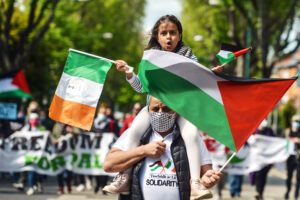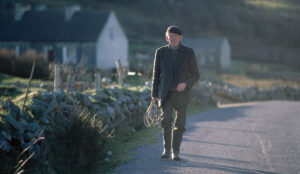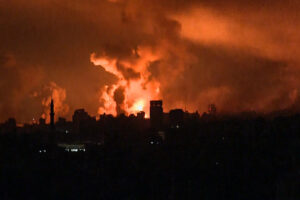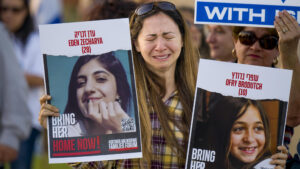The torment of Thomas Hand, an Irish man originally from Dun Laoghaire in Dublin, speaks directly to the most visceral fear of every parent: that, one day, we may find ourselves powerless to protect our child. Mr Hand lived with his eight-year-old daughter Emily in Kibbutz Be’eri near Gaza, but when Hamas attacked the kibbutz on October 7, Emily was at a sleepover at a friend’s house. She and her friend’s family have since disappeared.
Mr Hand was at first informed that his daughter had been killed, then told by the Israeli army that they now believe Emily is in fact alive and being held in Gaza. He appealed to Hamas at least to release its child hostages, to “have some humanity, some pity”. His daughter turned nine without him last Friday: he must now pin his hopes on the successful outcome of the newly forged hostage deal between Israel and Hamas.
On a brief trip to Ireland recently, Mr Hand appealed to Irish politicians for any help they could give. Both the Taoiseach Leo Varadkar and the Tánaiste Micheál Martin pledged their support in the strongest possible terms. Mary Lou McDonald, the leader of Sinn Féin, also expressed sympathy, saying that “the trauma and heartbreak being endured by this family is unbearable. I reiterate my condemnation of the taking of hostages and again reiterate our clear demand that hostages be released immediately”.
There is considerable sympathy in Ireland for Mr Hand’s situation, even as the public is appalled by the mounting civilian death toll in Gaza. But the plight of a young Hamas hostage of Irish-Israeli heritage is delicate territory for Sinn Féin. It has long been highly vocal about the Palestinian cause, and has had a number of contacts with Hamas over the years with an ostensible view to “furthering the peace process”. In 2020, for example, Sinn Féin hosted an online event — introduced by Mary Lou McDonald — featuring Palestinian speakers, including representatives of Fatah and Hamas. They included Dr Basem Naim, Hamas’s head of international relations, who joined from Gaza. Following the events of October 7, it was Naim who repeatedly told a clearly flabbergasted Sky interviewer that Hamas hadn’t killed any Israeli civilians.
Even as news was first leaking out about the horrors Hamas had enacted upon Israeli civilians, Sinn Féin’s youth wing, Ógra Shinn Féin, was assiduously tweeting about the historic crimes of Israel. Ms McDonald has herself condemned the Hamas attack, but has repeatedly called for the expulsion of the Israeli ambassador, Dana Erlich, over Israel’s bombing of Gaza. At the annual Sinn Féin party conference earlier this month, the Palestinian ambassador to Ireland, Jilan Wahba Abdalmajid, was met with a standing ovation and shouts of “Free Palestine!”.
Yet this tension runs deeper, too. While McDonald is no doubt sincere in her calls for Emily Hand’s return, the past activities of the Provisional IRA, and her own role in commemorating and defending the organisation, cast an ineradicable shadow over present events. On October 9, she said that “the targeting of civilians and the taking of hostages is to be condemned outright”.
But is it? Not, it seems, if targeting civilians, taking high-profile hostages, or simply “disappearing” people has been sanctioned by the IRA Army Council.
It is unfortunate timing for McDonald that the detail and consequences of PIRA tactics in the Seventies and Eighties are very much in the news recently. Last Saturday, the Irish businessman Ben Dunne Jr, the former director of Dunne’s Stores, died aged 74. Prominent Irish politicians spoke warmly of the deceased: Taoiseach Leo Varadkar described him as “larger than life”; McDonald tweeted that her “thoughts are with his beloved family”. It’s fair to say Sinn Féin’s thoughts weren’t primarily with his family back in October 1981, when Mr Dunne was abducted by masked IRA gunmen on his way to open a new supermarket in Co. Armagh; he was released a week later, reportedly after the payment of a very large ransom.
Compared to many other IRA kidnappings, however, Dunne’s had a happy ending. Many others didn’t, not least for the families damaged irrevocably by their trail of violence. A new book, The Kidnapping, by the Irish journalists Tommy Conlon and Ronan McGreevy, tells the grimly dramatic story of the IRA abduction of the Quinnsworth supermarket executive Don Tidey in November 1983. Mr Tidey was driving his 13-year-old daughter Susan to school near his Co. Dublin home when he was flagged down by someone he thought was a policeman. In fact, it was an IRA man, whose associates shoved young Susan Tidey to the side of the road — along with her brother Alistair, who was driving the car behind — and abducted Mr Tidey at gunpoint, seeking a £5 million sterling ransom.
Garda intelligence eventually tracked his IRA captors down to a place called Derrada Wood in Co. Leitrim and mounted a rescue operation. During it, two agents of the state were killed by the IRA: Gary Sheehan, a 23-year-old trainee Garda, and Patrick Kelly, a 35-year-old Irish Army soldier and father of four. The eldest of Private Kelly’s sons, David, later described the catastrophic effect of his father’s murder upon the family: his vulnerable mother remarried a controlling man who took them all to England, where they endured poverty and domestic violence: “we had fallen a long way in a short few years.”
In 2020, McDonald said of the IRA’s violence: “I wish it hadn’t happened, but it was a justified campaign.” David Kelly then asked her to condemn his father’s murder outright: when pressed, she owned that particular IRA killing, of an Irish soldier, was “wrong”.
Which killings, then, were right? Sinn Féin culture — which McDonald plays an enthusiastic role in upholding — is one of frequent, sentimental commemorations for “fallen volunteers” whose deeds are clothed in hazy euphemisms of “liberation struggle” and “active service”. It falls to others to document the brutal generational trauma which PIRA visited on the families of its victims.
Among the most harrowing are those cases in which an abduction was simply followed by silence, causing untold agony for relatives. Last week, the sixth search for Columba McVeigh was called off after failing yet again to uncover his burial site. Columba was a 19-year-old Catholic boy from Co. Tyrone abducted by the IRA in 1975: the IRA spread rumours that he was an informer, which his family has strongly denied. But love is stubborn, and for nearly 24 years after he disappeared, his mother Vera clung to the hope that he was still alive. She and his father bought Christmas and birthday presents for Columba every year, in case he came home. Then, in 1999, the IRA at last admitted that their son was one of the “disappeared” whom it had murdered and secretly buried in unmarked graves. Vera died in 2007 without ever knowing where Columba’s body was.
Thomas Niedermayer was another civilian who never returned home, after two men knocked on his Belfast front door just after Christmas in 1973, saying there had been an accident involving his car. His daughter Renate answered the door and fetched her father, who went out in his house slippers to take a closer look at the problem. As the recent documentary Face Down by the Irish director Gerry Gregg searingly records, it was the last time anyone in the family saw Niedermayer alive.
A married father of two daughters, Niedermayer was the well-respected German director of the Grundig plant in West Belfast, employing both Catholic and Protestant workers. Unluckily for him, the factory shop steward for a time — with whom, his former secretary recalls, he occasionally clashed — was a man called Brian Keenan. By 1971, Keenan was the quartermaster of the Belfast Brigade of the IRA. It appears he bore a grudge towards his former boss.
No one outside the IRA knew what had happened to Niedermayer, or who had taken him. His wife kept pleading to know his whereabouts, but myriad false rumours — deliberately planted — swirled around her husband’s disappearance, talk of affairs and gun-running. Then, seven years after he had vanished, thanks to a tip-off from an IRA informer, his body was discovered by police, buried face down in a fly-tipping site in Belfast’s Colin Glen.
The plan had been masterminded by Keenan, the informer said. It was intended to use Niedermayer as a bargaining chip with the British government for the return to Northern Ireland from England of the IRA bombers Marian and Dolours Price. On the third day of captivity, however, Niedermayer had made an escape attempt and was so brutally beaten by his captors that he died.
Much of Face Down is narrated by Niedermayer’s brave and dignified granddaughters, Tanya Williams-Powell and Rachel Williams-Powell. They are the only ones left to tell the story, because the murder took an almost unimaginable toll on the family. Mr Niedermayer’s wife Ingeborg, and their daughters Renate and Gabriele, all took their own lives by different means in the years after his death. So too did Gabriele’s husband Robin, in 1999.
The architect of the kidnapping, Brian Keenan, lasted quite a bit longer. In the IRA his tactical ruthlessness led him to be regarded as a figure of immense authority. He certainly seemed to impress the up-and-coming Mary Lou McDonald, eager to bolster her republican credentials after arriving in Sinn Féin from Fianna Fáil. In 2003, she appeared publicly alongside him at a commemoration for Sean Russell, an IRA man who died of a gastric ulcer in 1940 while on a German U-boat, having requested and received assistance from Nazi Germany to mount a proposed invasion of Northern Ireland. In 2008, after Keenan died from cancer, McDonald carried the coffin at his funeral. He is commemorated annually, with party members encouraged to join the Brian Keenan Mountain Challenge, a Sinn Féin fundraising walk.
With Sinn Féin now the largest party in Ireland, there is a distinct possibility that McDonald could be Taoiseach after the next election: her brand of confident outspokenness and vigorous indignation on grass-roots issues appeals to that large section of the Irish electorate which is disenchanted with the failings of the political old guard.
Yet the memory of Provisional IRA violence cannot be consigned to the past — as many would no doubt wish — in large part because Sinn Féin doesn’t want that to happen. The party is not interested in apology: it doesn’t crave forgiveness, but vindication. It doesn’t wish to forget Provisional IRA violence so much as to rewrite it, to repackage what was brutal, heart-breaking and squalid as something radical, exciting and heroic to a generation that never experienced the reality of the Troubles.
In so doing, Sinn Féin is steadily propelling the Republic of Ireland towards a kind of heightened internal battle of self-definition. There can be no easy reconciliation between those who seek to document Ireland’s gritty reality and those who energetically promote Sinn Féin doctrine: the portrait of the Provisional IRA and the Troubles that arises from The Kidnapping and Face Down is simply incompatible with the Sinn Féin narrative in which Gerry Adams or the late Brian Keenan are morally unimpeachable Irish patriots. And so the argument has become no longer simply about what Ireland does, but what Ireland is. Who is the true guardian of the nation’s identity: those who would commemorate the late Irish soldier Patrick Kelly, or those who would honour the organisation that killed him?
One can sense this deepening anxiety in the statements of Fianna Fáil and Fine Gael leaders. In September, after watching Face Down, Micheál Martin said that Sinn Féin was “infecting a new generation of young people” by “trying to triumphalise the horrible deeds” of the Provisional IRA. Leo Varadkar said recently that the idea of a Sinn Féin justice, foreign affairs or defence minister was “repugnant to me” given the party’s refusal to “acknowledge war crimes that may have happened in this country”. That is unusually strong language to use about an opposition party in a Western democracy, but the rift it signifies will only grow more intense. Part of that will be because — as we see now with the Middle East — the debate around other conflicts persists in holding up a mirror to Ireland’s past.
Disclaimer
Some of the posts we share are controversial and we do not necessarily agree with them in the whole extend. Sometimes we agree with the content or part of it but we do not agree with the narration or language. Nevertheless we find them somehow interesting, valuable and/or informative or we share them, because we strongly believe in freedom of speech, free press and journalism. We strongly encourage you to have a critical approach to all the content, do your own research and analysis to build your own opinion.
We would be glad to have your feedback.
Source: UnHerd Read the original article here: https://unherd.com/





